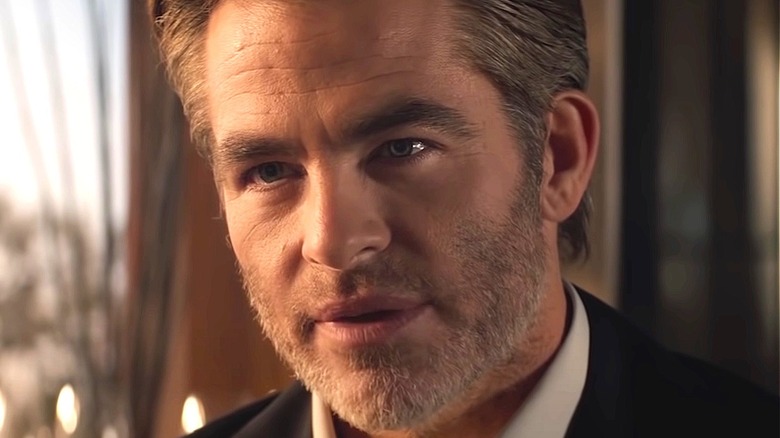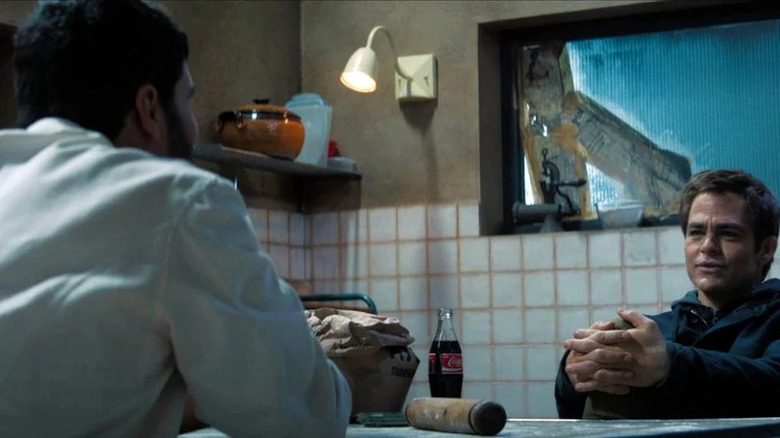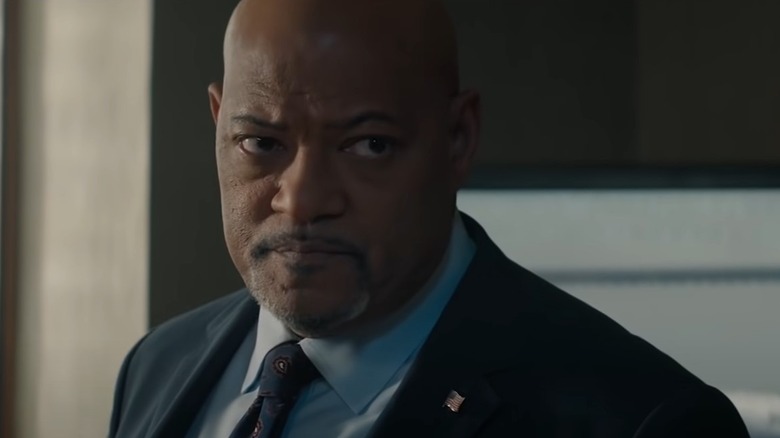The Ending Of All The Old Knives Explained
In a world of comic book movies and action franchises that rake in millions — and sometimes billions — of dollars, there really isn't as much room for standalone, character-driven genre films as there used to be. Luckily for viewers in search of such content, it seems that premium streaming networks have increasingly become the homes of projects like this. One of the latest offered by Amazon's Prime Video service is "All the Old Knives," a slow-burning thriller film centered around CIA agents.
"All the Old Knives" features a stacked cast, with Chris Pine and Thandiwe Newton as the stars of the film. The movie focuses on Pine's Henry Pelham and Newton's Celia Harrison, who are former lovers and working partners. The crux of the story involves Pelham investigating the fallout of an airplane hijacking eight years prior and the possibility that there was a mole in their team who fed information to the terrorists. The ending of "All the Old Knives" features many twists and turns, but none of them are as simple or as surface-level as they may appear, which is often the case with spy thrillers.
All the Old Knives' ending reveals a tragedy hidden underneath
At the climax of "All the Old Knives," it's revealed that Henry Pelham, the man sent to investigate potential traitors in the CIA, is actually the traitor himself. On the surface, this is a pretty standard plot twist for spy thrillers and not unlike ones used in other genres either. However, some viewers may have missed the tragic irony of Pelham's betrayal, especially when combined with his death at the very end of the film. See, Pelham only betrayed the CIA and his country in order to save the life of Celia Harrison, who had unknowingly put herself in harm's way with the mastermind of the terrorist plot, Ilyas Shushani (Orli Shuka).
Perhaps the most tragic twist of all comes in the form of Harrison's complicit actions that led to Pelham's own assassination by the CIA, as the agency had known about his betrayal all along. Pelham gave up everything, including the lives of over 100 people, to save Harrison's life, only to be killed eight years later thanks to Harrison's own little form of betrayal. Though, to be fair, Pelham did have his own assassin on standby, ready to kill Harrison at any moment, though it's never really made clear if he would have been willing to go that far to protect himself.
Shushani's plot is even more sinister than it appears
Viewers already know that Henry Pelham and Ilyas Shushani had a previous working relationship in "All the Old Knives," with the latter being an informant for the former during his time in Russia. However, this all changed when the CIA decided to hand Shushani over to the Russians in a move to improve working conditions. This eventually leads to a series of events that causes Shushani's daughter to die, which radicalizes the man and leads to the events of the plane hijacking, which itself leads to the deaths of over a hundred people on board Turkish Airlines 127.
However, it seems a little too coincidental that Shushani chose Austria, where Pelham just happened to be working at the time, for this hijacking to take place. While it's never outright stated with any certainty, Shushani's plot seems to be more than just a misguided attempt at freeing his fellow comrades from prison. The plot is at least partially intended to make Pelham suffer, to make him betray the CIA in the same way that he once betrayed Shushani. And for that to happen, Shushani used the life of Celia Harrison as a bargaining chip to ensure it. Sure, making the American government pay was likely a driving factor as well, but doing it through Pelham was likely a sort of poetic justice in the eyes of Shushani.
In All the Old Knives, love is a death sentence
While the events themselves are fairly clear in "All the Old Knives," the film has an even deeper thematic message that's scattered all throughout the film, and it's one that's pretty dour. Almost every single character makes their decisions based on love, and it's usually a death sentence. Henry Pelham decides to betray the CIA due to his love for Celia Harrison, and that leads to the deaths of all the passengers on the plane. Harrison, on the other hand, is motivated by her own love for her family and her freedom from the CIA, which directly leads to Pelham's death.
Even Ilyas Shushani, the terrorist mastermind behind everything, is motivated by the love of his deceased daughter. Pelham himself states in the film that nothing is more important to the man than the love he has for his family. This was a death sentence for the people on the plane, Pelham, and probably countless others. Intentionally or not, "All the Old Knives" makes the statement that to love is to set one up for one's own demise, though Harrison herself managed to escape this fate and return to her family unharmed, at least that's what's implied.
Still, Pelham seemed at peace with his own death, because he was finally able to see Harrison again and was able to clear his own presumably guilty conscience. Not exactly a happy ending, but few films in this genre get the luxury of that.



